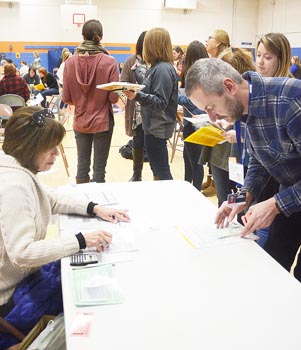The poverty effect

Jason Glashauser (left), music teacher at North Clinton and South Clinton Elementary schools, finishes his banking with Sharon Payne, an instructional assistant at South Clinton Elementary at the “Community Bank” during last week’s in-service. People wait in line while he finishes his dealings.
During a workshop last week at Clinton Elementary School educators took part in an in-service sponsored by the Tennessee Department of Education to show them how students from lower income families can be affected by poverty.
It was eye-opening.
Clinton City Director of Schools Kelly Johnson took part in a previous exercise. She knew what the educators from the school system were going to face.
Divided into family groups — ranging from a one person to four or five in a family — educators were given a “script” to follow.
The script listed details for each family member, whether they were a mother, grandmother, or teenager; the role they played in the family; and a family budget.
The budget included funds available, assets, and travel vouchers.
When a family member traveled to work, for instance, it cost them a travel voucher.
The budget also included bills (mortgages and loans) that needed to be paid.
The family unit was tasked with surviving one month without losing their homes, jobs, and educational opportunities.
A group of chairs were “home.”
The month was set up in four week time slots, meaning during each week it cost five travel vouchers to get to work or five vouchers to get to college. Family members attending K-12 schools did not need travel vouchers.
Travel vouchers were needed to visit all other services provided in the exercise, which included social services, the jail, the grocery store, the bank, etc.
Before the first week began the family unit was allowed time to plan their strategy.
“You can see the family units planning, and most of them will think they have a really good plan when they start,” Johnson said.
“But then real life takes over.”
Real life included spending a day at the social services office and not being talked with before the office closes.
At one point in the exercise a line of about 15 educators are sent home when the office closes.
That meant they did not accomplish what they set out to do, but they also lost a travel voucher.
Some were not able to purchase groceries after the grocery store closed, again costing a travel voucher with nothing to show for it.
Added to the mix is the rule that no child under 12 could be left home alone — child care must be provided and funds spent.
Also, police made regular visits to homes where suspected drug users lived. If the police found drugs at the home anyone at the home at the time were taken to jail — meaning more funds were needed to bail a family member out of jail.
“It sounds like chaos,” Johnson said. “But after the first week, they start to get the hang of it and they start to see the hardships involved.”
During the exercise about five families will fail. Their chairs (home) will be turned upside down and they will be sent to the workshops shelter.
If their is room for them.
The creators of this workshop modeled it in an urban area. There will be some resources available in the workshop that are not available in real life in Clinton.
Educators start to understand the effects of poverty on a student’s life a little more clearly during the third week.
Each “student” has taken home a flyer for a free spaghetti dinner to be held at the K-12 school during the third week.
But for a student to attend the dinner the family has to have a travel voucher. It is an after-school event.
Johnson noted it is a jolt for educators when they can’t attend a school function.
“They’re teachers, right? This is something they do in real life, so you know they want to take part in this part of the processs,” she said.
Without a travel voucher they can’t.
“This is when a lot of them realize why some students at their schools don’t attend many school functions,” she said. “It can really make you think.
Another noticable difference during the workshop is the number of teachers who start running from place to place — especially after standing in line and then getting shut out when the doors are closed for the day.
“It can be nerve wracking,” Johnson said.
The workshop is set up for one thing — helping teachers understand what an impoverished student may go through and how it can alter their performance in the classroom.
“It makes you think,” Johnson said.
“A lot of people see someone in a sitaution like that and they think, ‘just get a job,’” Johnson said.
“The dynamics of poverty are not that simple. There are families in this exercise that have jobs, but they are still struggling to cope.”
The workshop is paid for through the Tennessee Department of Education.


